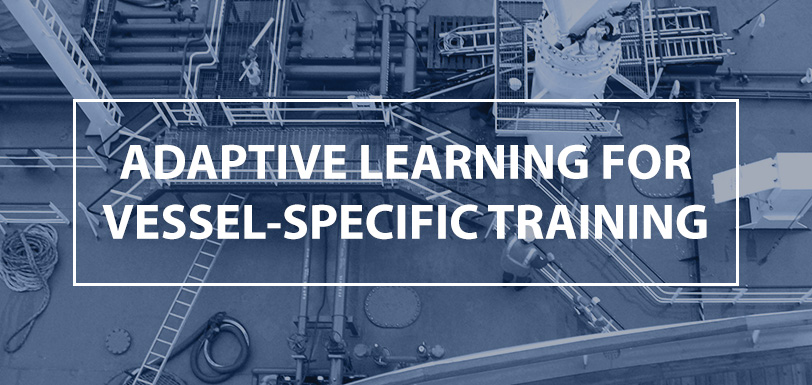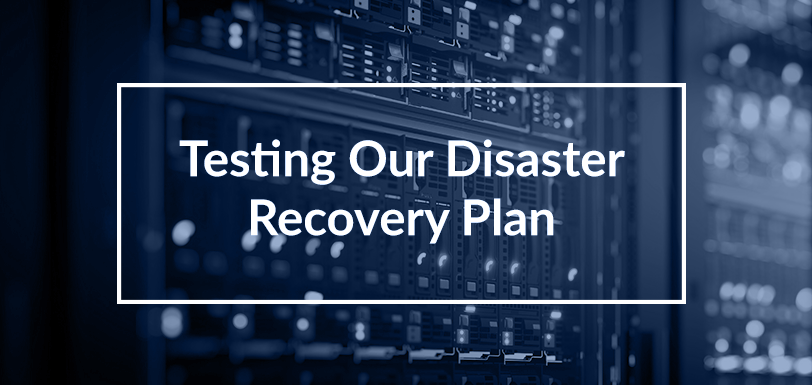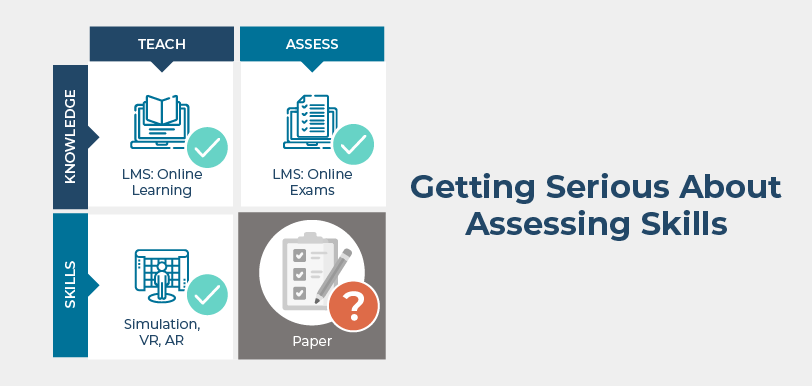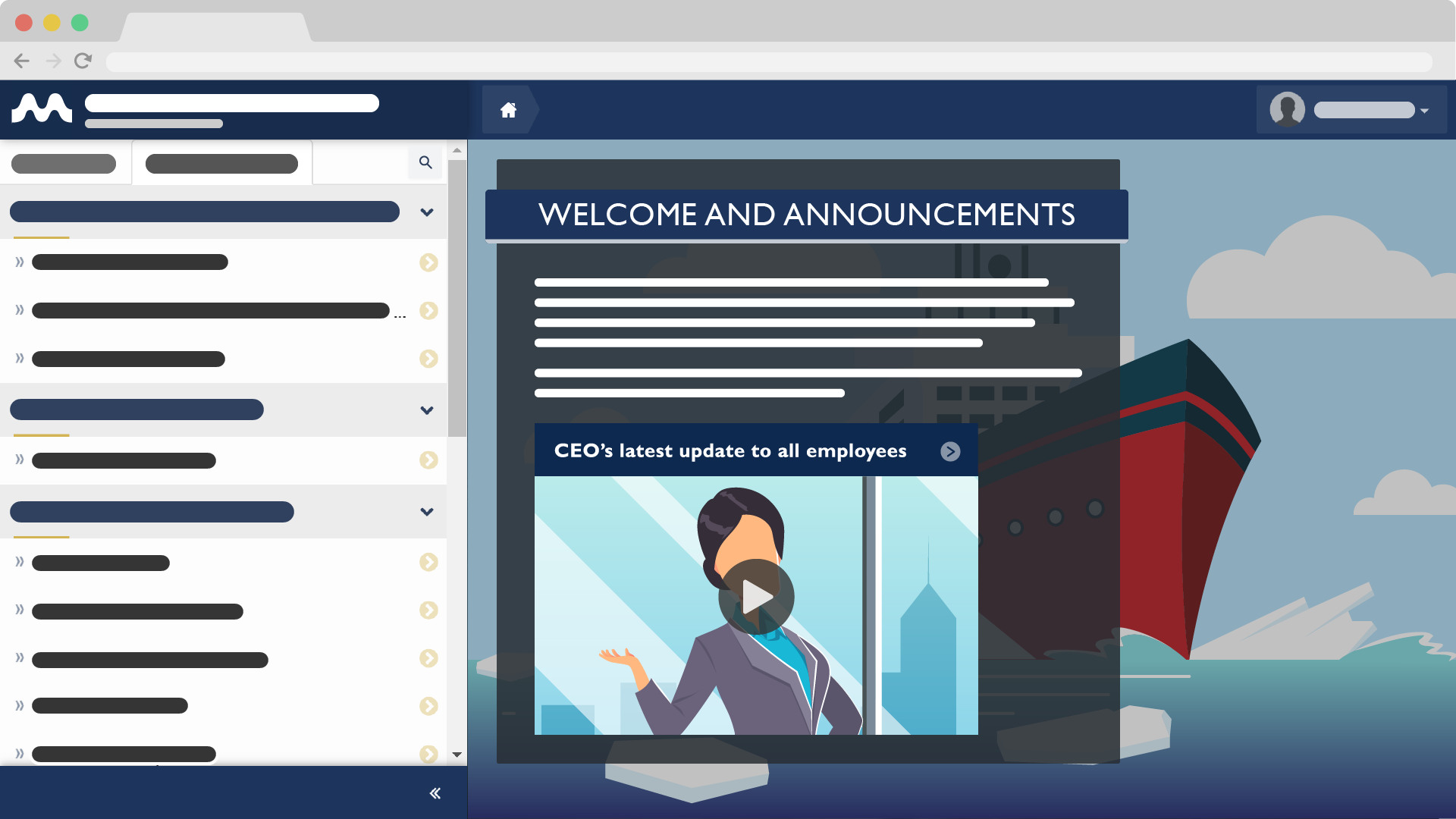Using Adaptive Learning for Effective Vessel-Specific Training
Aug 31, 2017 Murray Goldberg 0 eLearning, LMS, Maritime Training, Student-Centered TrainingIntroduction
It is difficult and expensive to do vessel-specific training well. This may explain why, unlike certification training, vessel-specific training is rarely standardized and in many cases poorly implemented – often via job shadowing.
But there is a technology which is an excellent tool for vessel-specific training, and every vessel operator should be aware of it. It is called adaptive learning. This article looks at what adaptive learning is, and examines one vessel operator’s deployment of it across a fleet of 35 vessels.
The Need for Vessel-Specific Training
Certification training is well defined and regulated by the STCW and the various flag state regulations. Course lists and curricula are specified, and even model courses are available to guide trainers. It makes sense that certification training is highly regulated and specified.
However, there is another training component which is largely unregulated but is arguably just as important to safe operations: vessel-specific training. This is the training required for safe operations given the unique combination of vessel characteristics, layout, equipment, routines, routes and corporate policies of the vessel operator.
Vessel-specific training has always been critical, but in recent years has grown more, in light of the continuously increasing sophistication of modern vessel-based systems. On top of that, simply knowing “how” to operate these complex systems is not enough. A deeper understanding is required in order to facilitate problem solving when the systems are not behaving as expected or, worse yet, when interactions between multiple on-board systems produce unexpected behaviours. Crews must be armed with the knowledge necessary to make an informed analysis and arrive at a logical decision.
There has been some recognition of this problem by the STCW. The best example is regulatory change for ECDIS training. ECDIS machines are essentially computers and training is required in order to understand how to operate them correctly. This training is now mandatory. But why do the regulations stop there? ECDIS machines are not the only sophisticated systems on board – far from it.
The Problem
ECDIS training is regulated because it is a single system being trained in isolation. However, specifying and regulating the training of all vessel-based systems and procedures is simply not possible given the infinite combinations of systems found on today’s vessels. Ignoring regulations, it is even difficult to deliver standardized vessel-specific training across one fleet. To illustrate, let’s look at an example.
Consider an operator which manages 50 vessels. Because our world is imperfect, these vessels are not uniform. There may be 5 different types of propulsion system over the 50 vessels. The operator may be working to standardize the bridge equipment, but differences remain. Fire fighting systems differ sometimes in their type and manufacturer, and differ always in their layout and implementation. And although the operator may try to standardize procedures across the fleet, the simple fact that each vessel differs from the others means that the procedures on board can never truly be the same. On top of that there are many other differences: life rafts differ, chutes differ, ship handling differs, and even the route that the vessel is currently operating on can require different reactions to an otherwise similar situation. So how can a vessel operator possibly create a standardized vessel-specific training program when the knowledge requirements vary so much from one vessel to another?
A potential solution is to create vessel-specific training programs in much the same way as we create vessel-specific manuals. Each vessel would have a separate (though overlapping) training program. This is possible, but very expensive to create and even more expensive to maintain. These training programs would have to be updated, in the same way that vessel-specific manuals are updated, each time a change occurs to the vessel. More problematic is that training programs, to be effective and remain current, should always be the subject of ongoing measurement and improvement. One change to a procedure (or even to the way that procedure is taught) may require updating all 50 training programs. Given that such updates are a necessary part of continuous improvement in training, the cost becomes prohibitive and the result is outdated and ineffective training courses.
In light of this problem, most vessel operators are relegated to highly imperfect techniques for vessel-specific training such as job shadowing. They may also combine it with small amounts of classroom-based training in order to facilitate vessel-specific training.
Fortunately, the technique of adaptive learning can provide a solution.
What is Adaptive Learning?
Adaptive learning is a computer-aided training technique designed to tailor each training instance to the needs of the individual trainee. Although this may sound complex, it can be surprisingly simple and highly effective. In general, adaptive systems “learn” about the student and then adapt the learning content and interaction to fit that student. For example, the student can be asked questions about learning goals, can be given evaluations to see what they know, and can even have his or her response times and other behaviours measured to try and tailor the instruction to the specific needs of that student. How can this be applied to vessel-specific training?
The best way to illustrate is to look at how British Columbia Ferry Services Inc. (BC Ferries) uses it to provide vessel- and route-specific training across its 35 vessels serving 47 terminals on 25 routes.
Adaptive Learning at BC Ferries
As one example: when a deckhand requires training at BC Ferries, the actual knowledge required will vary depending on the vessel and route the deckhand will be operating on. There are several different types of knowledge required:
- Core knowledge: knowledge that all deckhands must know. This includes company information, standardized procedures, safety and protective gear, etc.
- Vessel-specific knowledge: required knowledge pertaining to the vessel that the deckhand will be operating on. It includes equipment on that vessel, procedures unique to that vessel, and so on. It consists of hundreds of pieces of knowledge, the combination of which will be unique to that vessel.
- Route-specific knowledge: required knowledge pertaining to the route the deckhand will be operating on.
- Vessel-Route knowledge: knowledge required which is unique to the specific combination of vessel and route that the deckhand will be operating on. For example, operating procedures for the car ramps at the various terminals will often differ based on which vessel is at which terminal.
Clearly, the creation of custom training programs for every combination of job position, vessel and route would not be possible as it would number in the many thousands. This renders content creation and continuous improvement not financially viable for BC Ferries.
So instead, BC Ferries uses its learning management system (LMS) to provide the necessary training through adaptive learning. An LMS created for the maritime industry can provide adaptive learning specifically for this purpose.
The trainee experience is now as follows. When an employee begins their online training, they are first asked to specify three pieces of information:
- What position they are training for
- What vessel they will be operating on, and
- What route they will be operating on.
The training content in the LMS database is all tagged according to position, vessel and route. With the answers to the questions above, the LMS is now able to reach into the database and gather the various individual learning content required for that position on that vessel, while operating on that route. It then dynamically assembles all of this information into a single, cohesive learning package. The effect is as though someone created, by hand, a learning program specifically targeted at that employee.
The same is true for assessments. When a test is about to be administered (either online or on paper), the LMS asks for the position, vessel and route. The examination is then dynamically created to address the competencies specific to that combination.
The Advantages of Adaptive Learning
For the Learner
The advantages of adaptive learning are reasonably self-evident for the learner. They are provided with a learning program which is specifically targeted at the knowledge needed. It is cohesive and seamless and does not require the trainee to judge whether a piece of information applies to their position while on their vessel and route. Everything is relevant.
More importantly, adaptive learning makes this kind of deep vessel-specific (and route-specific, in this case) training possible where otherwise it would be a practical impossibility.
For the Training Organization
The advantages to the training organization are possibly even greater. Aside from the greatest benefit of improved training, adaptive learning creates efficiencies in learning content creation and maintenance – the same ones that make vessel-specific training possible. To understand them, a small bit of background is required.
When creating learning materials for an LMS which supports adaptive learning, one “learning resource” is created for every “thing” that needs to be trained. For example, if in a fleet of 50 vessels there are three different ECDIS machines, then three lessons need to be created for each machine. If four different RADAR units are dispersed across the fleet, then four lessons need to be created for RADAR – one for each unit. This is replicated for the various equipment and procedures which need to be taught. When these lessons are entered into the LMS database, they are tagged with the position, vessel or route to which they apply. Now, as described above, when a learner specifies their position, vessel and route, the LMS software gathers the learning resources and, using a “framework”, assembles them into a customized course.
Now perhaps the advantages to the training organization becomes more clear. First, in a fleet of 50 vessels, it is not necessary to write a separate, complete learning program for each vessel. Instead, each procedure or piece of equipment to be trained is documented only once in one small module, and then that module is tagged to indicate which vessels, positions, etc. it applies to. There is no redundant work required.
More importantly, maintenance of the courses is now very manageable. If a vessel has its ECDIS machine swapped out for another, all that is required is the changing of one tag in the LMS database to indicate which ECDIS machine now applies to that vessel. From that point on, training for that vessel will encompass the correct ECDIS machine. Likewise, if the training for one procedure or one class of ECDIS machine is updated to reflect some new information or training approach, only that one learning module needs to be updated, no matter how many vessels or positions that one module is relevant to.
From that point on, all trainees in positions or on vessels to which that learning module applies will immediately have the improved training experience. It is in this way that deep vessel-specific training is made possible and practical by an LMS which supports adaptive learning.
Conclusion
The advantages of adaptive learning to maritime industry training cannot be overstated. Properly applied it makes vessel-specific training not only possible, but also highly practical where previously it was neither. Given the importance of vessel-specific training in this era of ever increasing complexity of vessel systems and procedures, this technique is one which is critically important now and will only increase in utility and applicability as time goes on.
Follow this Blog!
Receive email notifications whenever a new maritime training article is posted. Enter your email address below:
Interested in Marine Learning Systems?
Contact us here to learn how you can upgrade your training delivery and management process to achieve superior safety and crew performance.






